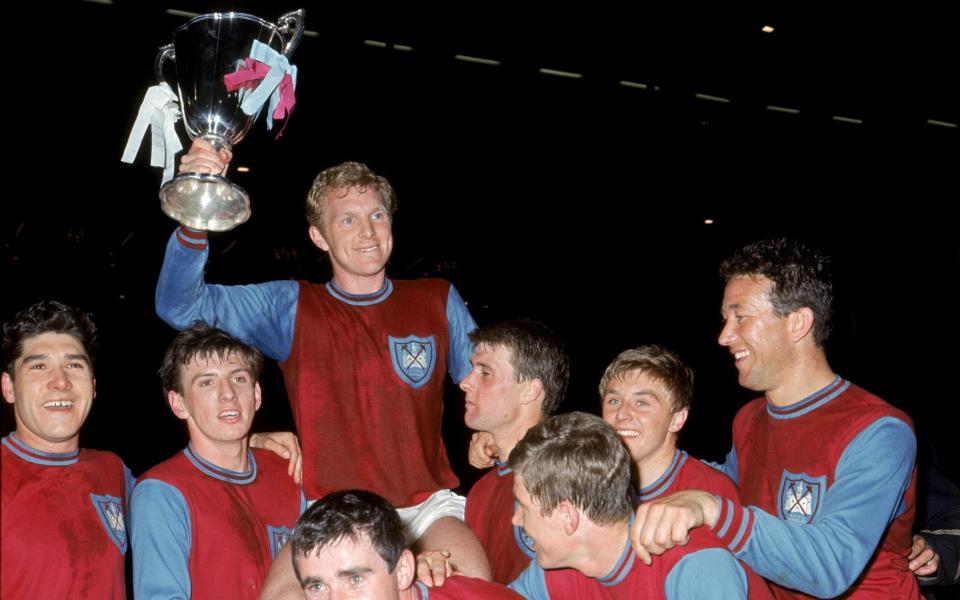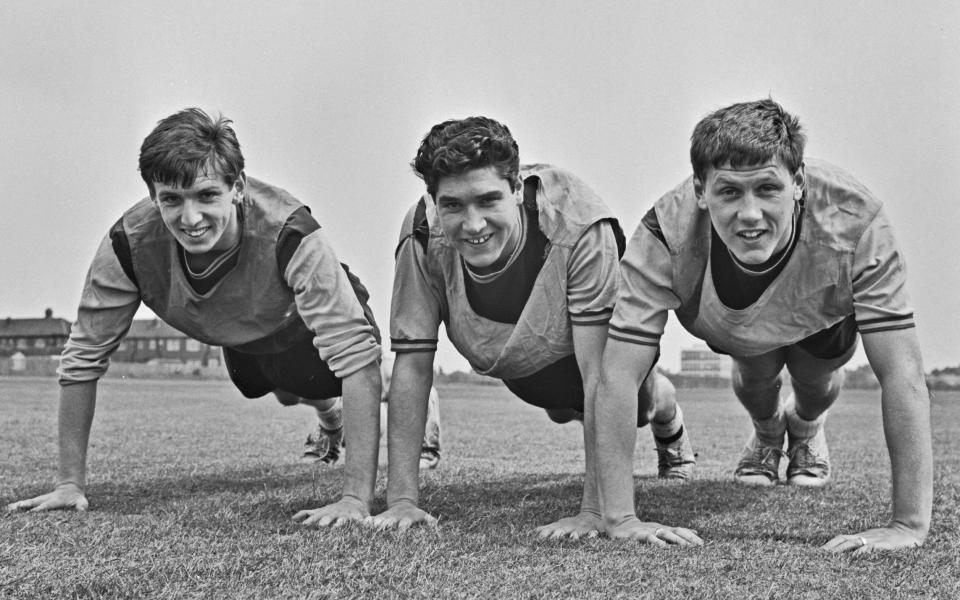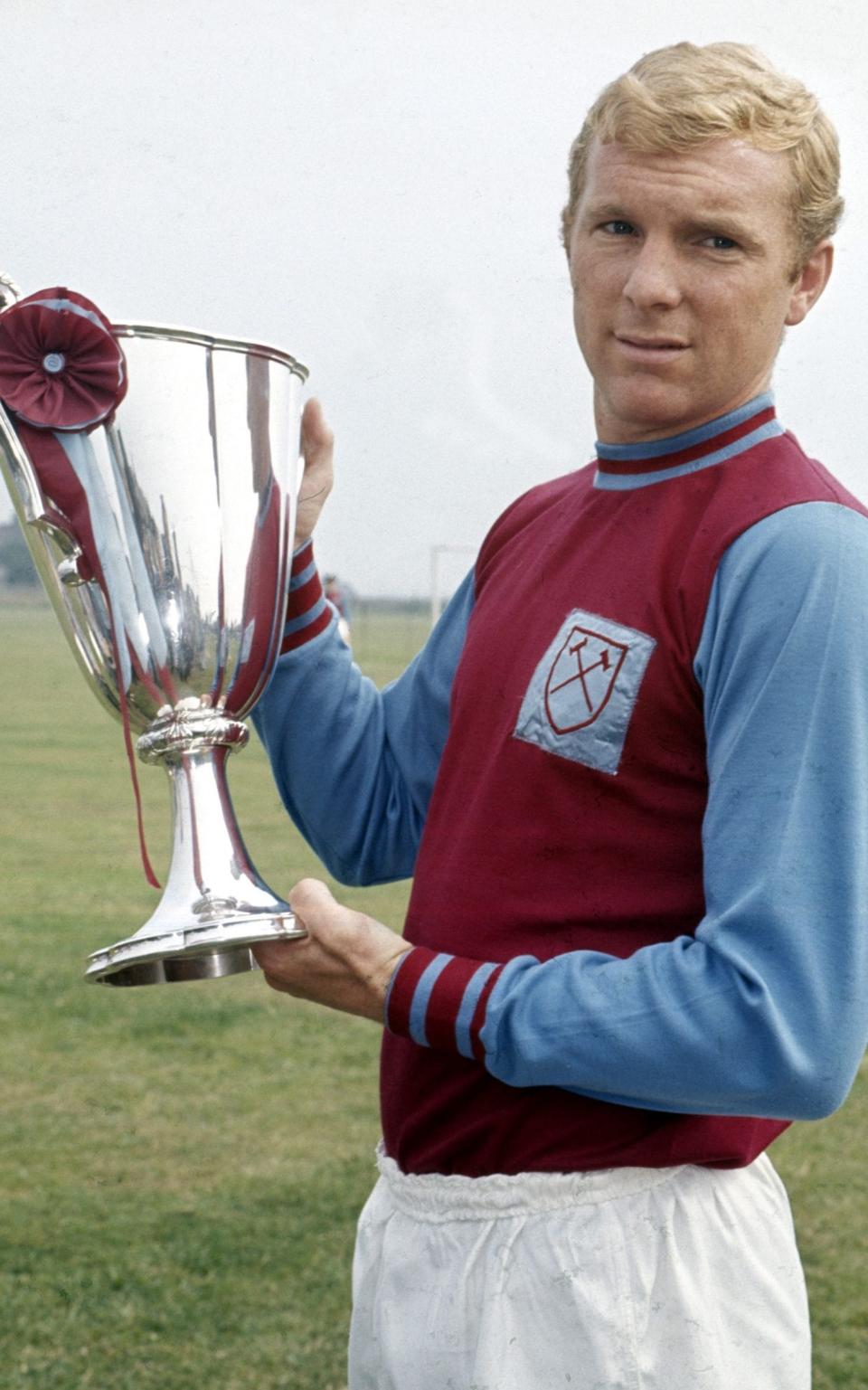‘We were mainly from Barking, Dagenham, East Ham’ – Remembering West Ham’s 1965 European success

Brian Dear still has the photograph framed on his kitchen wall and, almost six decades on from one of the great nights in West Ham United’s history, he still remembers the conversation in precise detail.
The scene was the dressing room at Wembley, on a Wednesday night in May 1965. West Ham were minutes away from kick-off in the European Cup Winners’ Cup final and, as they prepared to walk out onto the pitch, Dear was approached by Bobby Moore, his captain, with a quiet word of advice.
“Bobby said to me, ‘When we go out, there will be a bloke out there with some balls’,” Dear says. “‘I’ll grab one. Get one too, and walk behind me. That way, you will definitely get your photo taken’.”
Moore knew how to play the game, on and off the pitch, and his judgment was typically astute: as the photographers clicked away, Dear was in full view. The subsequent image has become one of the 79-year-old’s most treasured souvenirs, while the story itself serves as another reminder of Moore’s selflessness as a leader.
“It was a great honour to walk out behind Bobby that evening,” Dear tells Telegraph Sport. “An amazing night. It was a brilliant time for West Ham.”

More than 97,000 supporters were inside Wembley for the final against 1860 Munich, which West Ham won 2-0 thanks to a brace from Alan Sealey. Dear was on the pitch that night and he will be in the stadium in Prague this week, when a new generation of West Ham players will attempt to emulate the heroes of 1965.
“I would love them to win it,” Dear says of Wednesday’s Europa Conference League final against Fiorentina. “We had our day and we are still living off it. Hopefully they will be able to do the same thing, in a different stadium and a different era.”
To compare the current West Ham side with the boys of 1965 is to see how much the footballing world has changed. All 11 members of Ron Greenwood’s side were English, and nine of them were homegrown players from the club’s academy.
Football was so low-key compared to what it is now
“We were mainly from Barking, Dagenham, East Ham,” Dear says. “We were local boys. I lived a five-minute walk from the ground. Ronnie Boyce and I were at school together when we were seven years old, playing football with each other. It is just amazing that it happened, and there was a great atmosphere in the team. There were no big-time Charlies.
“It was a nice time to play football. A lot of us lived in Hornchurch, where a new estate had been built, and we used to be round each other’s houses in the afternoon for a cup of tea. Football was so low-key compared to what it is now – we would go to the pub after games and anybody could buy you a beer. They were good times. We were like a family.”


The prize for winning the final was £900 – £100 as an appearance fee, plus an £800 bonus. Finishing as runners-up would have earned the players nothing. “My first mortgage was only £28 a month, so I paid a few months with that bit of money,” Dear says with a laugh.
The preparations for the final consisted of a few days in the Hendon Hall hotel, some light training and, Dear says, an early night. “The hotel looked right down on Wembley, so for two days we were looking at the stadium.”
What followed was a wonderfully open match, with both sides looking to attack at all times. Munich had an impressive team, which included Bundesliga top scorer Rudolf Brunnenmeier, and the game flowed from one end to the other. “Not once did our physio or their physio come onto the pitch to treat anyone,” Dear says. “There were no breaks.”

Afterwards, as the team lifted the trophy, Dear floated a pound note down towards the supporters in the stands. Remarkably, he was to see that note again years later – on his television screen.
“There was a man on TV who was selling his memorabilia,” he says. “And all of a sudden he was telling this story about being at Wembley in 1965, about how this pound note came floating down in front of him. He said he looked up and saw me, and that I told him to have a beer on me. I remember doing that, and he still had the note.”
The team’s celebrations that night were far from wild. “We went upstairs to see our wives and girlfriends, had a couple of beers and sandwiches, and then we went home. That was it. I remember when Geoff Hurst scored the three goals for England in the World Cup final a year later, the next morning there was a Rolls-Royce to pick him up and take him somewhere in London for some big interview. That is how quickly times changed, in just one season.”

Dear, who was just 21 at the time, had only broken into the team a few months before the Wembley final. He came into the match on a sensational run of form, having scored 14 goals in his previous 14 games. Five of those goals came in the space of just 20 minutes in one match, against West Bromwich Albion.
Earlier in the season, the day before the team were due to travel to their quarter-final against Lausanne, Greenwood had asked Dear if he had a passport. “He said I was coming with them,” Dear says. “I told him I wasn’t going if I wasn’t playing. I won’t tell you what he said back to me… I was a bit of a lively boy.”
There is a joy in these memories, in looking back at how things used to be, and Dear spends much of his time with the Any Old Irons community group for West Ham fans who are over 65. The group was formed to help combat loneliness in the east London and Essex area and Dear is a regular attendee of their meetings.

The hope now, for all associated with West Ham, is that another chapter will this week be written in the club’s history. A new group of players and a new generation of supporters, trying to experience the same delights as those who lived through the glory days of 1965.
“It is lovely,” Dear says of the older supporters he meets. “They remember all those days. That’s what West Ham is about. It’s always been a family club. Those supporters have had their day and I am sure they are hoping that the fans of today will have their own joy on Wednesday.”


 Yahoo Sport
Yahoo Sport 





































